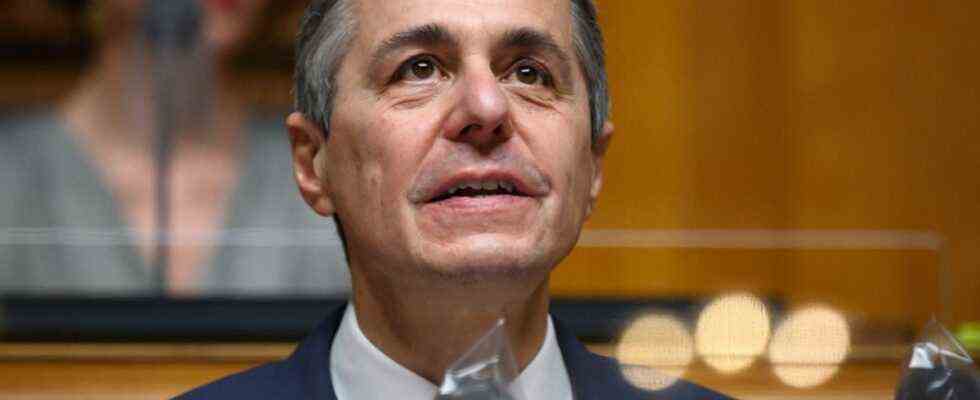A new Swiss Federal President takes office every New Year. It can be annoying for friendly governments, every year a new letter of congratulations, but that’s the way it is with the Confederates: All seven members of the Federal Council, as the Swiss government is called, have equal rights, and so that no one stands out, the office of president rotates mainly includes representative and organizational tasks. Because the type of rotation is also fixed (according to seniority), the federal presidential election, which always takes place in December, is basically a formality.
Nevertheless, this time the observers took a closer look, because it was the turn of Ignazio Cassis from Ticino: 60 years old, FDP politician – and controversial foreign minister. So one waited eagerly for the election result, a kind of popularity test of the candidate. On Wednesday afternoon the time had come: Cassis had scored 156 of 197 valid votes. The Foreign Minister must have breathed a sigh of relief. Because although this is by no means a brilliant result – no president has been elected with fewer than 180 votes since 2013 – it could have been worse. For Federal Councilor Micheline Calmy-Rey, for example, only 106 parliamentarians voted in 2011.
Such a memorandum vote was also expected at Cassis. The Ticino is considered the weakest Federal Councilor among the seven, and according to surveys the population considers him neither influential nor likeable. No other minister has worse scores.
At the beginning of his tenure as Federal Council, things looked very different. In 2017 the parliament elected him to the state government – as the first representative of Italian-speaking Switzerland for 18 years. That was cheered and taken as a sign that Swiss politics respected the constitutional requirement to respect the diversity of the country. It was also seen as beneficial for the balance in the country that a Ticino resident is now in the government, a representative of that canton that is not doing particularly well compared to other regions.
The fact that Ignazio Cassis, a trained physician and Ticino canton doctor until 2008, is a political career changer who ended up in parliament in 2007 without any political experience, initially did not play a major role. In the run-up to his election, many emphasized Cassis’ affable, cordial manner – an advantage if you want to become something politically in Switzerland. Federal councilors should be team players, not alpha animals. Cassis’ fluency – in addition to Italian, he speaks fluent German and French – was seen as a plus point that not all high politicians can come up with. After his election, Cassis took over the foreign ministry. That too: not a big issue at the time, although as a parliamentarian he had had less to do with foreign policy and more with health policy. “Sick-Cassis” was called him unflattering because of his mandates with various health associations.
Head shaking over Cassis’ ignorance and disorientation
In the meantime it is difficult to find people in political Bern who praise something other than his amiable manner or his trilingualism at Cassis. According to parliamentary circles, he simply couldn’t do it, and people in other European countries are also increasingly shaking their heads about Swiss foreign policy – and Cassis’ ignorance and disorientation.
The list of his faux pas is actually impressively long. First of all, the new minister made broad-shouldered announcements on the EU dossier, speaking of an early conclusion of the framework agreement desired by Brussels but controversial in the country – without having discussed this with his government colleagues. Then in May 2018 he publicly and completely surprisingly questioned the existence of the UN Aid for Palestinian Refugees in the Middle East (UNRWA), which at that time was still headed by a Swiss diplomat. At the beginning of 2019 he made headlines again because he visited a copper mine of the Swiss raw materials group Glencore on a visit to Zambia and was accused of seeing foreign policy primarily as a business-oriented interest policy.
Cassis probably made his worst mistake in the negotiations with the EU. It was he who, in the talks about the framework agreement, virtually single-handedly put the measures to protect high Swiss wages up for discussion. In doing so, he has significantly increased resistance in the country to the treaty. Around three years later, in May of this year, he broke off the deadlocked negotiations. A plan B for relations with Brussels? Not in sight. In Bern it is said that they are waiting for ideas from the Foreign Ministry – so far in vain. Cassis was so worn down by the criticism of his person that he dared not venture any more.
It remains to be seen whether the presidency will help him out of the impasse. As a doctor, he may be a particularly credible leader in pandemic times. In his speech after the election, he built on what he can do: he urged Switzerland to unite, in Italian, German, French and Romansh.

